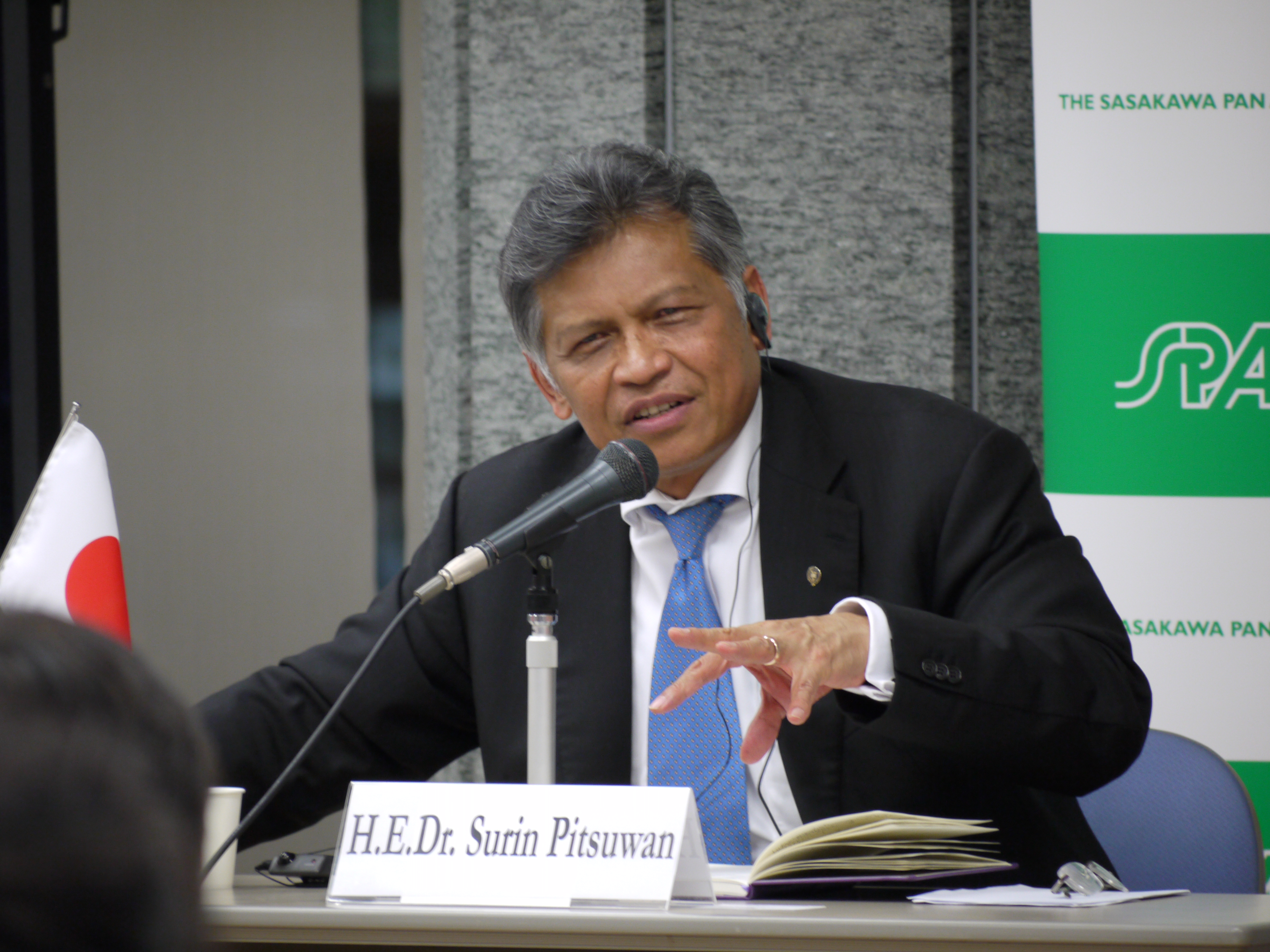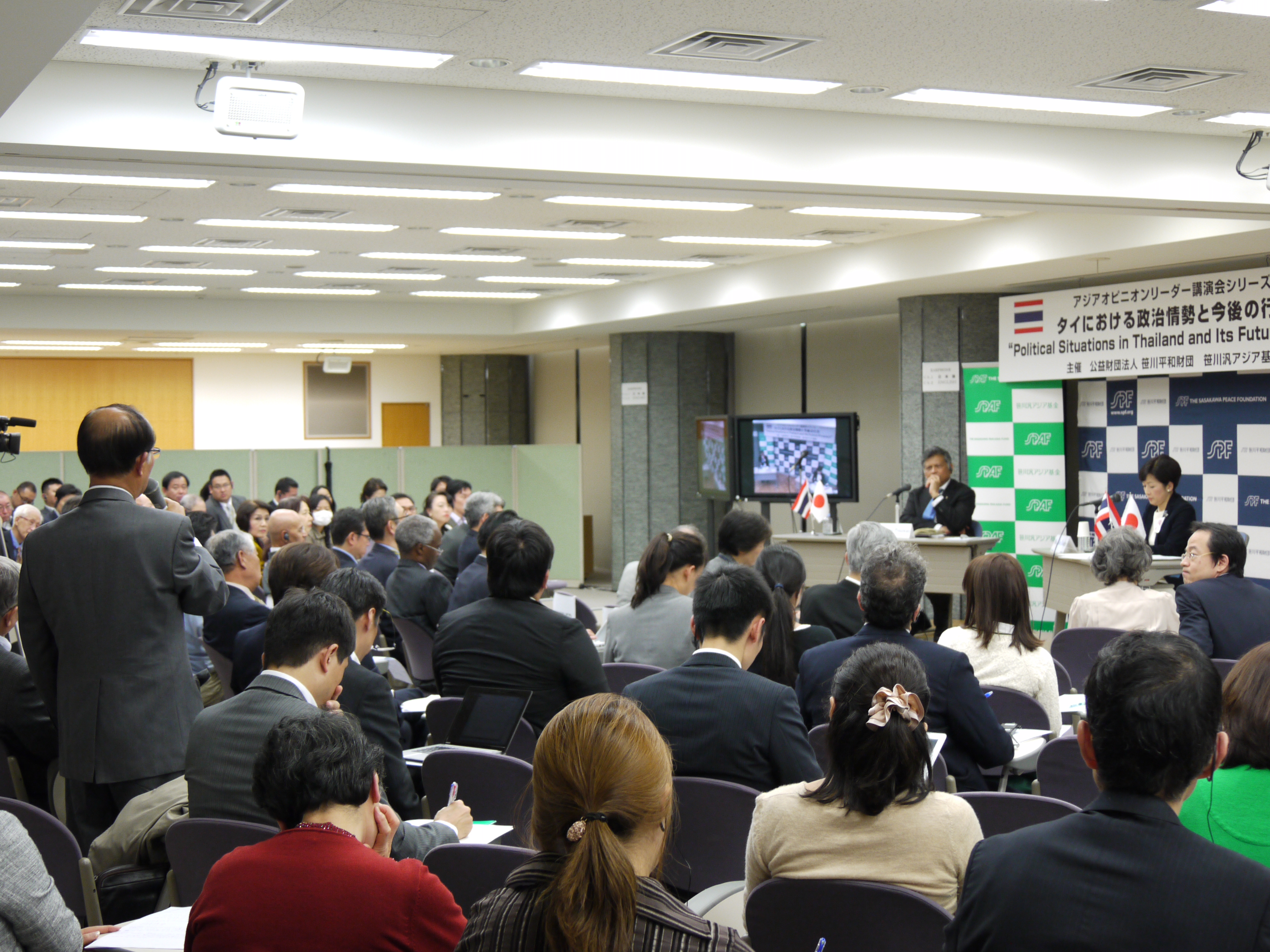
2014.11.19
In 2014, the Sasakawa Peace Foundation began the 'Promoting Japan-Asia Relations: An Opinion Leaders' Exchange' project in which opinion leaders with influence in decision-making and formation of public opinion in Asia are invited to Japan in order to promote people-to-people exchanges, strengthen cooperation, and deepen mutual understanding between Japan and Asian countries. As a first step in this project, the lecture entitled 'Political Situation in Thailand and its future Prospects'was given in October, 2014 by the former Secretary-General of ASEAN Surin Pitsuwan invited as the keynote speaker. The moderator was Ms. Aiko Doden, an NHK Senior Commentator with extensive knowledge of South East Asian politics and experience of living in Bangkok as a correspondence.

H.E.Dr. Surin Pitsuwan
Speaking on relations between Thailand and Japan, Dr. Surin mentioned that "Diplomatic relations between Thailand and Japan have existed for 125 years, and the two countries have built good, close relations, both politically and economically. This is a major reason why Japan and its people are paying close attention to the political situations and its future prospects in Thailand." Dr. Surin stressed that "There is no doubt that whatever the political situation is in Thailand, there will remain a good relationship between Thailand and Japan in the fields of politics and economy." Dr. Surin also discussed the participation of the army in politics, stating, "Since the 1930s up to the present, there have been a number of military coup d'états in Thailand, with national rule switching between civil and military administrations. Therefore, military involvement in politics is not something that holds strong negative memories for the Thai people."

Moreover, he explained about the perception of a 'coup d'état' in Thailand as follows. "With the emergence of Prime Minister Thaksin in 2001, the Thai people, particularly farmers in rural areas, began to hope that they themselves would be able to take part in politics and exert influence on the decisions of the central government. However, the reality was that although a populist policy was adopted and weath was distributed in rural areas to some extent, political power became more centrally concentrated. Subsequently, an excessive amount of power was taken by the central administration, and there were frequent instances of nepotism, abuse of authority, and corruptions. Thailand thus became split into two factions: the 'central' faction, composed of the middle-class, anti-Thaksin group, which bore the colour yellow and was characterized by vested privilege, and the 'rural' faction, which bore the colour red, was pro-Thaksin, and was composed of farmers and workers. Even after subsequent coup d'états and regime change, inequality between the central and rural factions continued to increase, and at the end of October 2013 the city of Bangkok became occupied by anti-government protesters, causing the conflict to come to a head. Even the general election in February 2014 and the resignation of Prime Minister Yingluck Shinawatra in May of the same year did not bring a resolution to the conflict between the reds and the yellows. On May 22, 2014 a d'état took place again. In effect, this coup d'état provided a much needed breathing space for the Thai people, coming as it did amid heightened levels of red contra yellow conflict without any resolution in sight. According to statistics, eighty-five percent of the Thai people were relieved that this breathing space had been given to them, and that an all-out armed conflict between the reds and the yellows had been avoided. In fact, they supported the intervention of the military."
Dr. Surin commented also on future prospects for Thai politics, pointing out that "The military enacted the coup d'état under the slogan of revolution and decentralization of power. A legislative assembly, interim cabinet, and the National Reform Council were established, with the aim of putting forth a new constitution and holding general elections within two years. For democratic politics to function, it is essential to respect the Constitution, prevent exercise of excessive power, and establish a bureaucratic system without nepotism. For the process of democratization, it is ideal to have the maximum possible level of citizen participation. The Thai people must take to heart the lesson of how their country was strangled by an excessive accumulation of centralized power, and consider what form Thai democracy should take in the future, and whether or not the military should participate in democratic rule. The democratization of Thailand will take time, and we hope we can count on the advice, support, empathy, understanding, and patience of Japan.